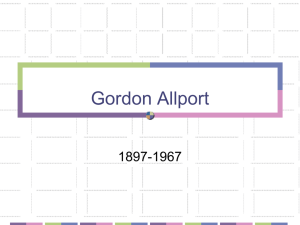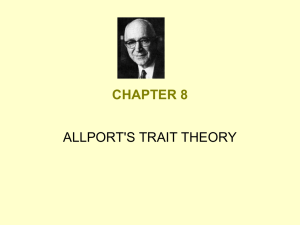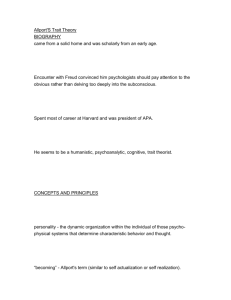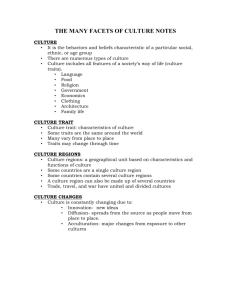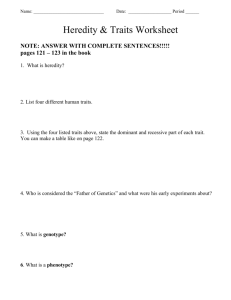nature vs. nurture - Ridgeview High School
advertisement
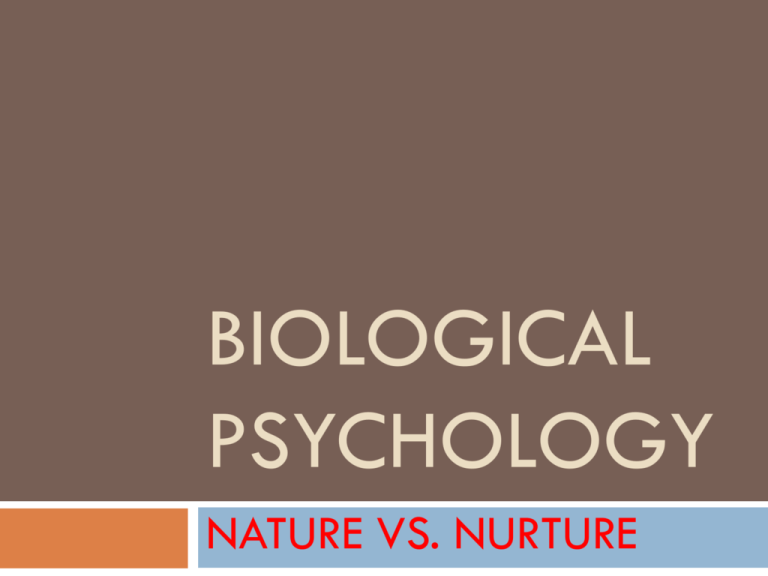
BIOLOGICAL PSYCHOLOGY NATURE VS. NURTURE Gordon Allport Founder of the Trait Theory Predispositions to respond, in a same or similar manner, to different stimuli After meeting Freud, Allport felt there was too much emphasis on inner drives Trait Theories of Personality We can describe people’s personalities by specifying their main characteristics (traits). Traits (honesty, laziness, ambition, outgoing) are thought to be stable over course of life Key Ideas of Trait Theory We are psychophysical beings Personality develops from both mental and biological influence Each person is unique Mind and body function together Everything is a characteristic of us and no one else Heredity (genetics) provides “raw materials” Environment shapes, expands, or limits heredity (raw materials) In other words, the individual combination of genes (except for identical twins) + the environment = personality Two personalities Childhood (more biological) Adulthood (more environmental) Childhood personality does not determine adult personality! Characteristics of Traits Traits They are real and exist; not theoretical Determine behavior; motivate us to seek stimuli and interact with environment Observable; we can see traits through consistency of response Interrelated; traits may overlap – related ones could occur simultaneously Vary with situations; could display one then the opposite Types of Traits Two types of traits Individual – unique to the person Defines person Also known as personal dispositions Common – common to culture Can change over time Types of Traits Three types of personal dispositions (individual traits) Cardinal Influential; it touches everything Our “ruling passion” EVERYBODY knows this about you Central 5-10 themes that describe behavior Take a moment and list what Most people know this about you Secondary Less consistent, even rare Only those close would know it you believe to be a cardinal trait, two or three central traits and at least one secondary trait. Other Characteristics Habits Specific responses to specific stimuli Inflexible Ex. Washing hands, brushing teeth Attitudes Specific objects of reference (not traits) Usually positive or negative Usually involves judgment or evaluation Allport: they guide behavior but aren’t traits Personality Personality Heredity Environment Traits Habits/attitudes Individual Common Cardinal Central Secondary Personality Functional Autonomy The motives of emotionally healthy adults Not committed to past Independent of original circumstances Example: adult children no longer dependent on parents Functional Autonomy – Two parts Perseverative functional autonomy Habitual ways of performing everyday tasks We just do them – no external reward Not integral part of personality – they persevere Example: We take the same route to school or work because it gets us there Functional Autonomy – Two parts Propriate functional autonomy Proprium is ego or self Which motives do we keep? Retain those enhancing selfesteem (I like) Discard those not enhancing self-esteem (I don’t like) Relationship between interests and abilities Allows for organization of stimuli (like/dislike) Organization of Propriate functioning Three principles Organizing the energy level Mastery and Competence Directing excess energy constructively Ex: new interests as we age High level at which we satisfy motives Motivation to perform highest level Propriate patterning Strive for consistency and integration of personality Keep what enhances self-image Reject what doesn’t Other behaviors not governed Reflexes, fixations, biological drives Functional Autonomy Functional Autonomy Perseverative Propriate Organizing Mastery Propriate the Energy and Patterning Level Competence LEADS TO EMOTIONALLY HEALTHY ADULT! Development of Proprium First Stage Bodily self Ages birth to age three Awareness of body Able to distinguish self from other objects Development of Proprium Second Stage Self-identity Ages birth to age three Realize you’re the same person despite changes Development of Proprium Third Stage Self-esteem Ages birth to age three Can accomplish things on own Crucial period Thwarting parents can create humiliation and anger Development of Proprium Fourth Stage Extension of Self Ages four to six Awareness of other objects and people belonging to child Development of Proprium Fifth Stage Self-image Ages four to six How child sees self How child would like to see self Parents make child aware of expectations Development of Proprium Sixth Stage Self as rational coper Ages six to twelve Rational/logical abilities can be applied to solving everyday problems Development of Proprium Seventh (and final) Stage Propriate striving After age twelve Existence of self and long range goals Begin to form future plans Where are you at with your propriate striving? Development of Proprium – role of parents IF parents provide affection and security Proprium develops Childhood motives transform to autonomy Self will grow Pattern of personal dispositions will form Result is a MATURE, EMOTIONALLY HEALTHY ADULT! IF childhood needs are frustrated Lack of psychological growth Proprium doesn’t develop Child becomes insecure, aggressive, demanding, jealous, self-centered Psychological growth is stunted Adult functioning at a level of childhood drives Criteria for mature emotionally healthy adults 1. 2. 3. 4. 5. 6. Extend sense of self to others/activities beyond self Relate warmly to others (closeness, compassion, tolerance) Self-acceptance = emotional security Realistic perception of self, develop personal skills, make commitment to some form of work Sense of humor/ self-objectification; understand self Unifying philosophy; directs toward future goals REFLECTION Based on Allport’s theory, how do you see your proprium developing? Based on the six criteria for a mature, emotionally healthy adult personality, how do you feel you are progressing down that path? What about non-healthy adults? Humans have conscious control Always in the process of “becoming” Shape life based on present and future HOWEVER Already formed traits and personal dispositions are hard to change Tension (is a good thing) Motivates us to accomplish Seek new challenges Accomplishment is the reward Study of Values Creates our philosophy of life Theoretical – discovery of truth Economic – what is useful and practical Aesthetic – artistic experiences Social – human relationships Political – personal power, influence, and prestige Religious – mystical; understanding of the world Criticisms of Allport How do you evaluate someone in a clinical setting? How do you test for other variables? How does an original motive get transformed into an autonomous one? Can you divorce childhood experiences and adult behaviors?
